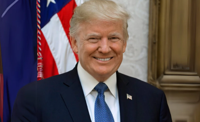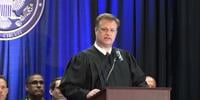
From left, California Gavin Newsom and California Attorney General Rob Bonta
Even after a federal appeals court ruled against them, California Gov. Gavin Newsom and Attorney General Rob Bonta are continuing to seek court orders limiting President Donald Trump's power to use the National Guard to help address riots from leftists and others seeking to use unrest to impede federal immigration enforcement in L.A.
On June 23, Newsom and Bonta filed a brief in San Francisco federal court, asserting U.S. District Judge Charles Breyer could still limit "how long, where, and for what purpose" Trump can use the National Guard.
Newsom's and Bonta's assertions were lodged four days after the U.S. Ninth Circuit of Appeals tossed aside Breyer's initial order declaring Trump had exceeded his authority by ordering 4,000 members of the California National Guard into service in response to riots in Los Angeles.
On June 19, a three-judge panel of the Ninth Circuit ruled Breyer was wrong.
In an action filed June 9, Newsom had argued the president must essentially first secure his permission before activating the California National Guard to respond to domestic unrest.
The governor had claimed the riots were not as bad as Trump had claimed, and attacks on federal immigration officers, local police and federal buildings and equipment did not amount to an insurrection or rebellion justifying the militarized response.
In the ruling, however, the appellate judges - including two Trump appointees and an appointee of former President Joe Biden - said they believed the law and the Constitution were on Trump's side.
"The Constitution assigns the power to 'call forth the Militia to Congress, and Congress has delegated portions of that power to the President," the judges wrote. "... Under the facts before us, we disagree that Defendants (the Trump administration) have clearly exceeded the scope of their statutory authority, so they are acting in accordance with the constitutional federal-state balance."
However, in the ruling, the judges believed they needed to "emphasize" that the ruling did not address other questions, including "the nature of the activities in which the federalized National Guard may engage" under the federal law, known as the Posse Comitatus Act.
For now, the judges said the troops can remain at Trump's direction to ensure rioters do not again attack federal officers and federal property.
The Ninth Circuit ruling was delivered as a so-called per curiam ruling, without a signed author. Ninth Circuit Judges Mark J. Bennett, Eric D. Miller and Jennifer Sung concurred in the ruling.
In response to the appellate ruling, Bonta and Newsom immediately pledged to continue their legal fight against the President and his use of the Guard.
"The Trump Administration far overreached its authority with its unprecedented and unlawful federalization of the California National Guard and deployment of military troops into our communities," Bonta stated in a prepared statement on June 19. "As senior military leaders serving in administrations from JFK to Obama have affirmed, the use of the military on U.S. soil should be ‘rare, serious, and legally clear.’
"That is not the case in Los Angeles where our state and local law enforcement officers responded effectively to isolated episodes of violence at otherwise peaceful protests and the President deliberately sought to create the very chaos and crises he claimed to be addressing."
In their ruling, Ninth Circuit judges had not agreed with Bonta's and Newsom’s assertions that the violence was merely "isolated instances" that had been "effectively" contained by local police.

Trump
Bonta and Newsom followed through on their pledges to continue fighting Trump in court, filing their brief on June 23.
In the brief, they noted the appeals court's "emphasis" on the unanswered questions not addressed in the Ninth Circuit's rulings, and urged Breyer to again issue an injunction against Trump, potentially managing how, when and where the President can use California Guard units.
"This Court ... has jurisdiction to consider whether actions taken pursuant to the federalization orders, which are essentially unlimited in geographic and temporal scope, are justified with regard to the current state of affairs in Los Angeles and elsewhere," Bonta and Newsom said in their brief.
"Although the Ninth Circuit held that, on the ... record before it, conditions in and around the federal building in Los Angeles on June 6 and 7 likely satisfied (the law's) factual predicate for federalization of National Guard units in the first place, the Ninth Circuit did not consider, nor did the parties present, the questions of how long such federalization is permissible in the face of changed circumstances or whether those federalized troops may be deployed in areas where those conditions never existed or have ceased to exist."
In response, the Trump administration submitted a brief calling Bonta's arguments that the Posse Comitatus Act somehow doesn't "allow the President to use Guardsmen to execute the laws" an "absurdity."
"... It would be illogical to hold that, although the President can call up the National Guard when is unable 'with the regular forces to execute the laws of the United States,' the Guard, once federalized, is forbidden from 'executing the laws,'" the Justice Department wrote.
The Justice Department asserted the Guard's mission is far from over, as the President believes they are still needed to protect federal property and federal immigration enforcement operations to ensure rioters do not again attempt to use violent mob actions to interfere.
And the Justice Department further noted California can identify no legal precedent empowering a federal court to limit the duration, locations or purposes of troop deployments ordered by the President under federal law.
While federal law "provides the process through which the National Guard becomes federalized, it imposes no durational limits on the President’s exercises of his Commander-in-Chief power over a properly federalized Guard," the Justice Department wrote.
Judge Breyer has not yet ruled on the renewed request by California for an altered court order purporting to limit Trump's powers over the California National Guard.






